|
Wolfgang Amadeus Mozart
(1756-1791)
Requiem KV 626 &
Maurerische trauermusik, K 477
Musique funèbre maçonnique, K 477
Masonic Funeral Music, K 477
|
|
/aliavox_heritage.jpg) |
|
Réédition / Reissued
Alia Vox AVSA9880
Code-barres/Barcode :
7619986398808 |
|
Édition remasterisée |
Remastered edition |
|
Super Audio CD |
|
|
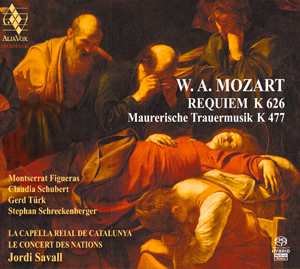
|
Description
Artistes / Performers :
Montserrat Figueras, soprano, Claudia Schubert, alto
Gerd Türk, ténor
Stephan Schreckenberger, basse
La Capella Reial de Catalunya,
Le Concert des Nations,
dir. Jordi Savall
Lieu d'enregistrement / Recording site:
Église des Dominicains - Guebwiller (Alsace)
Dates d'enregistrement:
08/1991
Recording dates: 08/1991
Durée totale / Total time: 50'51
|
Édition originale |
Réédition |
 |
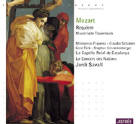 |
ES
8759 &
ES 9915 |
Naïve - 9965 |
|
|
 |
|
|
|
|
Évaluations recensées / Reviews
located |
|

11/1992
See
below
|

#
383 (06/1992)
Voir ci-dessous |

# 33 (06/2001)
Voir ci-dessous |

16:2 (11-12/1992)
See
below
|

Par: Jean-Jacques Millo |
Classical CD Reviews
Gavin Dixon (blog) |
|

Requiem de Mozart |

Mozart's Requiem |
|
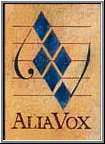
Extrait du livret / From the liner notes |
|
 Le "REQUIEM" en Ré
mineur.
Le "REQUIEM" en Ré
mineur.
Testament spirituel de Mozart
Jordi Savall nous présente
ici sa "...
conception de l’interprétation
qui, d’un bout à l’autre, doit nous faire revivre toute la ferveur
chaleureuse de la foi catholique et l’espoir de la miséricorde
divine. Plainte funèbre émouvante et instant de grâce, elle est le
produit d’un équilibre surprenant entre la force déclamatoire et
rythmique du texte et son insertion mélodique, entre l’envol
presque infini des lignes polyphoniques et leur attachement à une
force harmonique inexorable, entre les détails de l’articulation
et les contrastes de la dynamique. Elle apparaît surtout à travers
cette perception du mouvement qui fait du tempo le véritable cœur
de la musique : souffle ou pulsation, déchaînement ou prière, qui
nous permet d’accéder, par la juxtaposition dans un même élan de
toutes ces forces, à un des plus grands messages du génie créateur
humain sur le mystère de la mort."
Poursuivez votre lecture - texte intégral
AVSA 9880 :
Cliquez ici
~~~~~~~~~
 The "REQUIEM" in D minor.
The "REQUIEM" in D minor.
Mozart's spiritual testament.
Jordi Savall writes about his interpretation od the work in
the following terms: "...from
beginning to end, it should make us feel all the warmth and
fervour of the Catholic faith and trust in God’s mercy. The
Requiem is a moving funeral lament and also a miraculous moment of
grace, with that surprising balance between the declamatory,
rhythmical force of the text and, its melodic setting, between the
almost infinite flight of the polyphonic lines and its attachment
to an inexorable harmonic force, between details in phrasing and
contrasts in dynamics. It appears above all through that
perception of movement, which makes the tempo the true heart of
the music: whispering or throbbing, passion or prayer – by the
juxtaposition of all these forces in one great upsurge of feeling,
we attain one of the greatest messages that the human creative
genius has ever produced on the mystery of death.
Translation: Mary Pardoe
Read on - Full text
AVSA 9880:
Click here
|
|
Gramophone-
(11/1992)
|
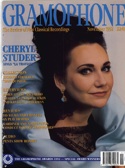
|
Subscription
Abonnement |
Reviewer:
Stanley Sadie
Excerpt:
"Jordi
Savall's ...
performance (is)
quite intimate and
relaxed in tone, and to my ears not really very devotional in
atmosphere; the singing is almost undercultivated, and the rhythms
surprisingly jaunty for a Requiem. Well, the Sanctus is certainly
more jubilant than usual, and the "Osannas" go with a fair swing;
so, less persuasively, does the "Rex tremendae majestatis". The
period instruments provide, as usual, lucid, airy textures (through
which the timpani and the trombones cut effectively), as does the
modest choir, which sings with a good deal of skill—listen to the
clear and athletic semiquaver runs in the Kyrie fugue, for instance,
or the lively "Quam
olim
Abrahae". Some of the solo singing is so simple in manner as to seem
almost simple-minded: though I would add that the alto, Claudia
Schubert, is outstanding, with a real grasp of the idiom. That is
just what is lacking elsewhere: the performance is ultimately too
far removed from a true Mozartian style to offer more than a
superficial account of the work." |
|
Diapason- # 383
(06/1992)
|
|
Appréciation
2 DIAPASONS
Evaluation |
Abonnement
Subscription |
Analyste: Olivier
Opdebeeck
Résumé ou abrégé:
Une analyse des plus dévastatrices...
Point de vue émis à l'occasion de la parution du CD en 1992.
Quelques extraits:
"La déception: tel est le sentiment qui nous traverse à l'écoute de
ce ... Requiem sur instruments d'époque. Car Jordi
Savall ne semble pas avoir été au bout de ses idées."
"Ce qui nous déçoit en fait, c'est le manque d'intériorité et de
cohésion dans la vision de Savall. L'absence de cohésion provient
peut-être du type de recrutement de l'orchestre et du choeur. Des
ensembles aussi réduits demandent un travail de polissage dans tous
les détails... Même remarque pour le choeur: de belles voix certes,
mais pas de sonorité fondue... Ce manque de cohésion se retrouve
aussi chez les solistes."
En guise de conclusion, Opdebeeck écrit: "... ce Requiem
passe sans que nous ayons ressenti sa profondeur, la douleur qu'il
sous-tend."
"Ce bilan pourra paraître sévère, sans doute. Il est à la mesure des
espoirs que le plus grand gambiste de sa génération a fait naître en
abordant une page archiconnue, dont on espérait une vision
nouvelle."
|
|
Classica- # 33
(06/2001)
|
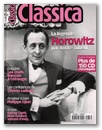 |
Appréciation:
Note: 5
Evaluation:
|
Abonnement
Subscription |
Analyste: Non précisé
Résumé ou abrégé:
Pour le chroniqueur de Classica, il s'agit d'une
réédition du Requiem de Mozart hautement recommandable. Il
souligne que "... Savall fait entendre sa différence et nous offre
une lecture vigoureuse et originale du Requiem. Tempi
d'une grande vélocité, articulations et phrasés précis et
tranchants, cuivres et timbales au premier plan dessinent un
Requiem flamboyant et captivant, ..."
|
|

16:2 (11/12 - 1992) |
 |
Abonnement
Subscription |
Reviewer:
Stanley Sadie
Excerpt:
"Savall
uses period instruments with the traditional edition of the Requiem.
This is a powerful performance, yet Savall mostly avoids driving it
too hard. It's quicker than any version known to me except Parrott's
(and, of course, the Maunderized Hogwood), matching Malgoire, who by
contrast merely seems to be rushing pell-mell through the work.
Gardiner, Hickox, Neumann, and Koopman come closest to this
celerity, which shows that there is more to an interpretation than
timing. Only Figueras is well known among the soloists, but this is
also a well-balanced quartet. What makes Savall special is the
feeling of celebrating a Mass for the Dead that often fails to
animate a performance, however dramatic or operatic it might be. The
preferred version for those who are looking for religious devotion
is Karl Böhm's granitic sixty-four-minute version on DG. A
comparable quality at the opposite extreme of tempo can be found
here. The sound, captured by Pierre Verany (usually working for his
own fine label) in an unfamiliar Alsatian church, is appropriate,
Savall's notes are revealing, and the text alone is printed". |
|
|
|
Autres références disponibles via la base de
données de Todd McComb/ Other available references via
Todd McComb's database:
(Site: http://www.medieval.org)
Re:
Astrée 8759 |
|
|
|
|
To order / Commander
Réédition / Reissued
Alia Vox AVSA9880
Code-barres/Barcode
:
7619986398808
|
|
La viole de
gambe
Parutions
récentes |
Viola da gamba
Recent
releases |








